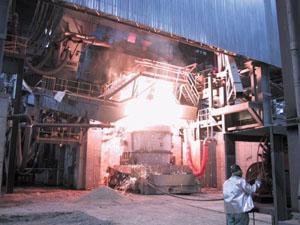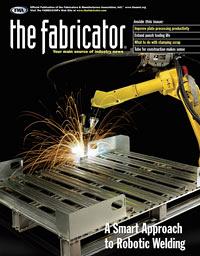Contributing Writer
- FMA
- The Fabricator
- FABTECH
- Canadian Metalworking
Categories
- Additive Manufacturing
- Aluminum Welding
- Arc Welding
- Assembly and Joining
- Automation and Robotics
- Bending and Forming
- Consumables
- Cutting and Weld Prep
- Electric Vehicles
- En Español
- Finishing
- Hydroforming
- Laser Cutting
- Laser Welding
- Machining
- Manufacturing Software
- Materials Handling
- Metals/Materials
- Oxyfuel Cutting
- Plasma Cutting
- Power Tools
- Punching and Other Holemaking
- Roll Forming
- Safety
- Sawing
- Shearing
- Shop Management
- Testing and Measuring
- Tube and Pipe Fabrication
- Tube and Pipe Production
- Waterjet Cutting
Industry Directory
Webcasts
Podcasts
FAB 40
Advertise
Subscribe
Account Login
Search
Man of Steel: FABTECH keynote speaker Ferriola discusses harnessing change in steel
- By Stephanie Vaughan
- October 10, 2002
- Article
- Shop Management
It's all about progress, and John Ferriola has seen his share of it.
Ferriola is executive vice president of the Sheet Mill Group at Nucor Corp., Charlotte, N.C., and has been with the company for 12 years. At his keynote address at FABTECH® International (see page 35), he'll talk about the progress he's seen in the steel industry and the changes that are on the way--and what these changes mean to steel consumers.
"These are exciting times in the steel industry as we experience industry changes, customer changes, and even political changes," Ferriola told The FABRICATOR. "It's the most informed supplier that will meet these needs and do well in business. More than ever, it's time for the customer and supplier to be more informed."
Nucor and its affiliates manufacture steel products, with operating facilities in 10 states. Products produced are carbon and alloy steel in bars, beams, sheet, and plate; steel joists and joist girders; steel deck; cold-finished steel; steel fasteners; metal building systems; and light-gauge steel framing.
During his 12 years with the company, Ferriola has been general manager of Nucor Steel-Indiana, general manager of Nucor Steel-Nebraska, general manager of Vulcraft-Texas, and maintenance manager of Nucor Steel-Texas.
Making the Most of Industry Change
Regarding recycling steel, Ferriola said it's important for Nucor not only to accept change in the steel industry but also to embrace the technology that will make the most of those changes to serve steel consumers better.
"We believe in technology and staying at the cutting edge of technology," he said.
In traditional flat-rolled steel production, a thick slab is rolled through reduction mills to make final steel coil products. In 1988 Nucor started using thin-slab casting: Instead of starting out with a 10-inch-thick slab of steel, the company used only 2-in.-thick original material.
Today, with the strip casting process, Ferriola said the company can start out with strip as thin as 2 millimeters and reduce the final product to 0.026 in. to decrease the amount of work and energy required.
In his keynote address, Ferriola will discuss new major steel processing technologies Nucor is employing.
One new technology is the HIsmelt® process, which converts iron ore to liquid metal through the injection of noncoking coal and iron ore into a molten iron bath, according to Ferriola.
Because the process eliminates the need for sinter or pellet plants and coke ovens, HIsmelt's environmental impact is more favorable than traditional ironmaking technologies", he said. Additionally, the technology is capable of processing ore that is unsuitable for current iron and steel technologies.
Nucor also is commercially testing "micromill" technology, which was developed in Australia. This type of steel processing allows continuous casting of sheet steel from molten metal.
Using new steel processing technologies can help steel manufacturers as well as steel users, Ferriola said.
"We can process faster to respond faster. There's potential for substantial cost savings," he said.
Necessity: The Driving Force Behind Change
According to Ferriola, necessity is the driving force behind change. For instance, in the automotive industry, standards constantly are changing as automakers try to build lighter yet high-strength vehicles made of corrosion-resistant materials.
And for Nucor, a major force behind accepting change is the employees. The company has firm beliefs in company culture and empowering its staff, Ferriola said.
"A lot of companies say they value their employees, but we empower them to make decisions because we believe that they can make the best decisions," he said.
"One of the things Nucor does well is accept change," Ferriola said. "We recognize that the only constant in life is change. Look at the [aero]space industry and the metals required to build a space shuttle versus the metals required to build a Wright Brothers airplane."
Through all of the changes in the steel industry, Ferriola emphasized the importance of using good materials to make good products.
"We have Boeing 747s and 787s that are faster, and the next generations will be faster than that and will require different materials," he said.
"Our customers need a wider range of products, and we need technology to produce these products," Ferriola said. "It's important to have a good, consistent source of raw material. If the industry doesn't change to meet customers' changing needs, they'll find another way to do it by using plastics or some other material."
About the Author

Related Companies
subscribe now

The Fabricator is North America's leading magazine for the metal forming and fabricating industry. The magazine delivers the news, technical articles, and case histories that enable fabricators to do their jobs more efficiently. The Fabricator has served the industry since 1970.
start your free subscription- Stay connected from anywhere

Easily access valuable industry resources now with full access to the digital edition of The Fabricator.

Easily access valuable industry resources now with full access to the digital edition of The Welder.

Easily access valuable industry resources now with full access to the digital edition of The Tube and Pipe Journal.
- Podcasting
- Podcast:
- The Fabricator Podcast
- Published:
- 04/16/2024
- Running Time:
- 63:29
In this episode of The Fabricator Podcast, Caleb Chamberlain, co-founder and CEO of OSH Cut, discusses his company’s...
- Trending Articles
AI, machine learning, and the future of metal fabrication

Employee ownership: The best way to ensure engagement

Steel industry reacts to Nucor’s new weekly published HRC price

Dynamic Metal blossoms with each passing year

Metal fabrication management: A guide for new supervisors

- Industry Events
16th Annual Safety Conference
- April 30 - May 1, 2024
- Elgin,
Pipe and Tube Conference
- May 21 - 22, 2024
- Omaha, NE
World-Class Roll Forming Workshop
- June 5 - 6, 2024
- Louisville, KY
Advanced Laser Application Workshop
- June 25 - 27, 2024
- Novi, MI



























